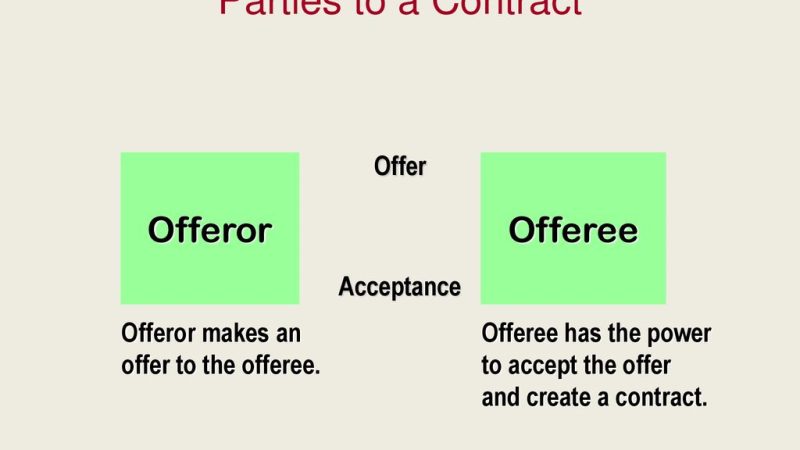In the world of contracts, understanding the roles of the offeree vs offeror is crucial. These terms represent the foundational parties involved in the creation of a legally binding agreement. The offeror is the one making the proposal, while the offeree is the party to whom the offer is made. Their interplay sets the stage for the acceptance, rejection, or negotiation that forms the basis of contract law. This article delves into the key differences, responsibilities, and scenarios involving offerors and offerees, helping you navigate these roles with clarity.
Who Is the Offeror?
The offeror is the party that initiates the contract formation process by presenting an offer. This offer outlines the terms and conditions that the offeror is willing to fulfill, contingent upon the acceptance of the offer.
Responsibilities of the Offeror
- Clearly Defined Terms: The offer must be precise, outlining what is being offered, along with the expectations or considerations required.
- Communication of the Offer: The proposal must be communicated to the offeree through verbal, written, or electronic means.
- Intent to Contract: The offeror must demonstrate an intention to enter into a legal relationship if the offeree accepts.
Examples of Offerors
- A business owner proposing a sale of goods.
- A landlord offering a lease agreement to a tenant.
- A contractor submitting a bid for a construction project.
Who Is the Offeree?
The offeree is the party who receives the offer and has the authority to accept, reject, or counter the proposal. The acceptance by the offeree creates a legally enforceable contract, provided all other legal elements are met.
Responsibilities of the Offeree
- Acknowledgment of the Offer: The offeree must recognize and consider the terms of the proposal.
- Decision-Making: The offeree has the option to accept, reject, or propose a counteroffer.
- Timely Response: The response must align with any deadlines or time frames stipulated by the offeror.
Examples of Offerees
- A potential buyer considering a seller’s terms.
- A job applicant reviewing an employment offer.
- A supplier responding to a purchase order.
The Offer and Acceptance Process
The interaction between an offeror and an offeree is central to contract formation. Let’s break down this process:
Step 1: The Offer
- The offeror presents a proposal that includes terms, conditions, and the consideration (e.g., payment).
- The offer must be clear and definite to avoid ambiguity.
Step 2: Communication to the Offeree
- The offer is communicated to the offeree, typically via written documents, oral agreements, or digital platforms.
Step 3: Acceptance or Rejection
- The offeree reviews the offer and decides whether to accept, reject, or make a counteroffer.
- Acceptance must mirror the terms of the offer (the “mirror image rule”) for a valid contract.
Step 4: Formation of a Contract
- If the offeree accepts, a contract is formed, binding both parties to the agreed-upon terms.
- If rejected, the offeror may revise the offer or withdraw it entirely.
Key Differences Between Offeree and Offeror
| Aspect | Offeror | Offeree |
| Role in the Contract | Initiates the offer | Receives the offer |
| Responsibilities | Defines terms, communicates proposal | Decides to accept, reject, or counter |
| Power of Action | Limited after making the offer | Holds the power to accept or reject |
| Examples | Seller, landlord, employer | Buyer, tenant, job applicant |
Real-Life Applications
Business Transactions
In business, the offeror might propose a service agreement, while the offeree evaluates the terms to determine feasibility. For example, a digital marketing agency offers a package to a client, who then decides whether to accept or negotiate.
Employment Contracts
An employer acts as the offeror by presenting a job offer to a candidate (the offeree). The candidate’s decision—whether to accept, decline, or renegotiate salary—dictates the outcome.
Real Estate Deals
In real estate, the seller typically acts as the offeror by proposing a sale price and conditions. The buyer, as the offeree, can accept, negotiate, or reject the terms.
Legal Considerations
Revocation of an Offer
The offeror can revoke an offer before it is accepted. However, this must be communicated to the offeree.
Counteroffers
When the offeree makes a counteroffer, the original offer is voided. The offeree becomes the new offeror, flipping the roles in the negotiation process.
Time Frames
Both offerors and offerees must adhere to any stipulated deadlines. Delays can render the offer invalid.
Conclusion
Understanding the dynamic between an offeree and an offeror is essential in contract law. While the offeror initiates the process with a proposal, the offeree holds the power to accept or decline, ultimately shaping the agreement. Whether you’re drafting, negotiating, or accepting contracts, recognizing these roles can help ensure fair and effective agreements. By mastering these basics, individuals and businesses alike can confidently navigate the complexities of legal contracts.
FAQs
1.What happens if an offeree does not respond to an offer?
If the offeree does not respond within a reasonable time or the specified time frame, the offer may expire.
2.Can an offeror withdraw an offer after acceptance?
No, once an offeree accepts the offer, a legally binding contract is formed, preventing the offeror from withdrawing.
3.Is a counteroffer a rejection of the original offer?
Yes, a counteroffer is considered a rejection of the original offer and constitutes a new proposal.
4.What makes an offer legally binding?
For an offer to be binding, it must include clear terms, consideration, and an intent to create legal obligations.
5.Can an offeree accept part of an offer?
No, partial acceptance is not valid. Acceptance must align fully with the terms outlined by the offeror.
Also read: Exploring Eze Village: A Fairytale Destination in the French Riviera









